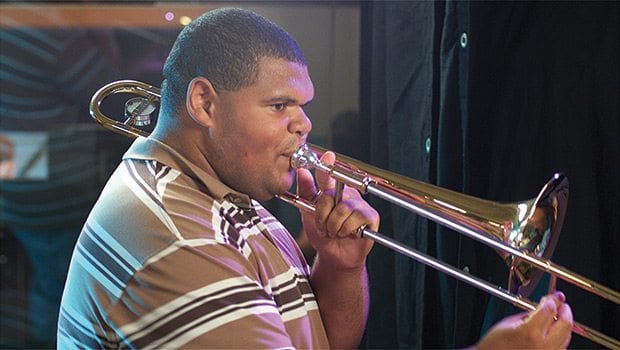Bass Clef Bliss an inspiration
Mother and son’s adjustment to autism chronicled in biopic

Before Terrence Partridge turned 2, his parents first noticed delays in the development of age-appropriate social skills. In fact, he actually began to regress soon thereafter, as words he was using began to disappear from his vocabulary.
It would be a couple more years before his parents received the devastating diagnosis that their son was autistic. Unfortunately, the marriage would not last, as is so often the case with families touched by autism, and the burden of raising Terrence would fall entirely on his mother Therese’s shoulders.
Since early intervention can be critical in a child’s prognosis, he was lucky she committed herself to giving him the love and support of more than two parents. His mother resolved to become an expert in autism, since it can manifest in myriad ways, making what might be viable treatment for one child totally inappropriate for another.
Musical interest
In Terrence’s case, he exhibited an early interest in music, and is among the one in 10,000 people blessed with perfect pitch. Recognizing his talent, his mother proceeded to cultivate it with the help of Louise Titlow, Terrence’s trombone instructor. Under his patient teacher’s tutelage, the boy blossomed into a promising prodigy. He would one day play in San Diego’s New Youth Classical Orchestra as well as jazz in a combo led by trumpeter Gilbert Castllanos.
Louise Titlow modestly describes her student’s seemingly miraculous achievements with, “All it takes with Terrence or any autistic child is a little bit more love, a little more time, and a little more faith.”
She says, “He can be an angel of healing self-expression through music, and heal others as he’s uplifting himself.”
Directed by Patrick Scott, Bass Clef Bliss is an alternately heartrending and uplifting biopic chronicling the tight bond between a mother and son as together they confront an assortment of daunting challenges associated with autism. Scott makes an impressive debut here, as he delicately balances the access he was afforded to his subjects’ daily lives, mindful of their concerns about personal privacy.
Besides focusing on Terrence and Therese’s trials, tribulations and ultimate triumphs, this informative documentary features a cornucopia of facts and figures about autism, courtesy of both experts and anecdotal evidence. For example, in 1985, one in 2,500 babies developed the disorder. Today the number is about one in 68.
Because autism is so widespread, a labor of love like Bass Clef Bliss is certain to resonate deeply with any spiritually-inclined soul compassionately attuned to other than self.






